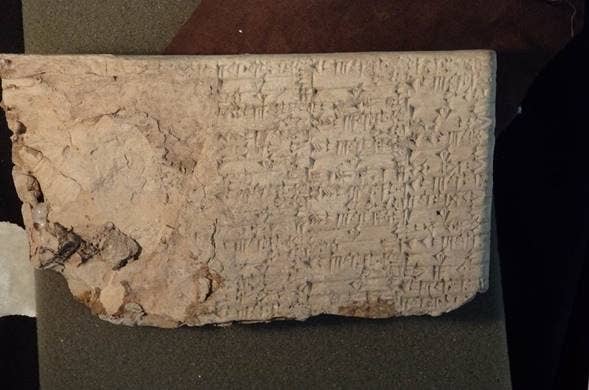
In 2010 and 2011, a series of packages were shipped to Hobby Lobby's headquarters or one of the craft retailer's affiliates. Shipping labels described the contents as clay tiles or tile samples of minimal value, but, according to federal prosecutors, they were actually valuable ancient artifacts of Iraqi origin being smuggled into the United States.
Hobby Lobby has now agreed to forfeit thousands of antiquities that it bought over the years — via a process that prosecutors say was "fraught with red flags" — and pay an additional $3 million to resolve any claims by the US government, according to court papers filed on Wednesday.
US laws restrict the import of Iraqi cultural items that were looted from Iraqi institutions or where "a reasonable suspicion exists that they were illegally removed." Iraq bars the export of antiquities and restricts private possession.
According to prosecutors, an expert hired by Hobby Lobby to advise the company on its acquisitions warned that antiquities likely from Iraq carried "considerable risk," and noted that hundreds of thousands of objects — including cuneiform tablets and cylinder seals, which Hobby Lobby ultimately purchased — had been looted from Iraq since 1990.

Hobby Lobby reached an agreement with the government to give up thousands of artifacts and to adopt new internal measures to make sure any future acquisitions comply with customs laws and regulations. The company will also have to file regular reports for 18 months about new purchases of "cultural property." Hobby Lobby did not admit any criminal wrongdoing.
Hobby Lobby said in a statement provided to BuzzFeed News that the company "did not fully appreciate the complexities of the acquisitions process," which led to "regrettable mistakes."
“We should have exercised more oversight and carefully questioned how the acquisitions were handled,” Hobby Lobby President Steve Green said in the statement. “Hobby Lobby has cooperated with the government throughout its investigation, and with the announcement of today’s settlement agreement, is pleased the matter has been resolved.”
The forfeiture comes as Green prepares to open the Museum of the Bible in Washington, DC, a project that he has spearheaded and that will reportedly feature items from his vast private collection of biblical artifacts. The forfeiture case filings don't mention the museum, but the company said in a statement on Wednesday that Hobby Lobby had been buying artifacts over the years to share "with the world in public institutions and museums."
The US attorney's office in Brooklyn, which prosecuted the case, said in a statement on Wednesday that the buying process "was fraught with red flags," and that Green signed off on the purchases. At an inspection of artifacts that Green attended in 2010, for instance, prosecutors said that the items were "displayed informally" and often with little protective material around them.
When Hobby Lobby received a statement from one of its dealers about the provenance of several thousand artifacts, the company and its agents never contacted the person listed as the custodian, prosecutors said. And in December 2010, Green authorized $1.6 million to be paid to seven bank accounts that prosecutors said were associated with five different people.
Hobby Lobby and its affiliates received at least three packages of artifacts, according to court filings, while five other packages were intercepted by US customs officials. The intercepted packages had shipping labels that described the contents as "hand made clay tiles" manufactured in Turkey, valued between $1 to $5 each. In reality, prosecutors said, the artifacts were ancient cuneiform tablets or clay bullae valued at hundreds of dollars apiece, according to the invoice.
The Daily Beast first reported in 2015 that Hobby Lobby was the subject of a federal investigation relating to the tablets — highlighting the 2011 seizure of "somewhere between 200 to 300 small clay tablets" en route to the company's headquarters. Hobby Lobby, in response, told reporters it was cooperating with investigators.
The Justice Department will publish notice of the forfeiture. If no one files a claim, the court will forfeit the property to the United States. Then, the government of Iraq could petition the Department of Justice for the artifacts. The head of the Justice Department's Money Laundering and Asset Recovery Section will make the final decision about what happens to the artifacts.
